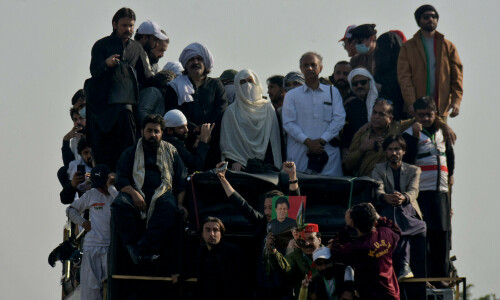NEW DELHI, Nov 26: The foreign ministers of India and Pakistan met here on Wednesday amid renewed interest by the international community in a peaceful resolution of the Kashmir dispute.
Even as Foreign Minister Shah Mehmood Qureshi and his Indian counterpart Pranab Mukherjee held wide-ranging talks, including a clutch of minor and major disputes, the French government joined the arriving US administration in linking the prospects of peace in Afghanistan with the resolution of the Kashmir issue.
Addressing a news conference with his Pakistani guest, Mr Mukherjee was quick to reiterate that Kashmir was a bilateral issue and would be resolved bilaterally. To that extent no third-party mediation was required. Mr Qureshi, on the other hand, took care to clarify that the dispute had not been sidetracked and would be taken up at the next round of the Composite Dialogue.
Sources close to their talks said Mr Qureshi had discussed his agenda in India with British Foreign Secretary David Miliband in Islamabad earlier on Wednesday. It was not likely that the growing renewal of international interest in the Kashmir issue was not taking up in his meeting with Mr Mukherjee.
Taking the cue from US President-elect Barack Obama, France too said on Wednesday that it shared the view that peace in Afghanistan was linked to how secure Pakistan felt about its problems with India over Kashmir.
Delhi’s NDTV news channel quoted the official spokesman of the French government as saying that a peaceful settlement of the India-Pakistan dispute on Kashmir could pave way for a better security situation in Afghanistan.
“The logic behind it is that if Pakistan is free of the tensions on its eastern border it shares with India, then Islamabad could concentrate more on security issues that dog its western border which straddles with Afghanistan,” NDTV said in a dispatch from Paris.
It quoted Mr Eric Chevallier, special adviser to the Minister of
Foreign and European Affairs, who is also the spokesperson for the French Foreign Office, as saying to visiting journalists that the renewed interest and the new international push to solving the longstanding Kashmir dispute ‘makes sense’.
According to this line of thinking, he said, if there is decreased tension on the Pakistan-India border with Kashmir, the Pakistani security apparatus could put enhanced efforts in securing the porous border Pakistan shares with Afghanistan.
“Solving the Kashmir dispute will help everybody in the region,” Mr Chevallier said. He added that resolving the Kashmir issue might also help avoid the cross-border bombing of the tribal areas of Pakistan.
Emphasising that there was a need for a negotiated settlement to the Afghan problem, France is hosting in Paris a special regional meeting of all the countries that are neighbours to Afghanistan, with the hope that a quick solution can be found to the Afghan crisis, Mr Chevallier said. He emphasised that “there is no military solution to the issue of Afghanistan”.
On being questioned as to whether France supports the UN plebiscite in Kashmir, Mr Chevallier said: “The Kashmiri people should find a way to develop peace in the region.”
Mr Qureshi arrived here on Wednesday on a four-city tour of India and said he had come to India with an “open mind” and “open heart” to “build bridges” between the two countries.
The two foreign ministers met for more than one and half hours and discussed the issue of terrorism and combating the common threat jointly, enhancing trade, visa liberalisation, the plight of prisoners in both the countries and increasing religious pilgrimage.
The foreign minister said his interaction with Mr Mukherjee was very constructive, positive and forward looking. He said raising the level of religious pilgrimage must be encouraged which would promote inter-faith dialogue, tolerance and tourism. And to illustrate that, he would be going to Ajmer on the last leg of his tour on Saturday.
Water dispute
The Pakistani minister sought a “mechanism” to settle a dispute with India over water from the Chenab river, according to Reuters.
“We should see a mechanism is available and we should avail that mechanism to address this issue,” Mr Qureshi told reporters after his meeting with Mr Mukherjee.
“I am reassured that the Indian leadership is conscious of respecting the Indus Water Treaty in letter and spirit.” The treaty divides up control between India and Pakistan of several rivers draining into the Indus river basin.
Mr Mukherjee said his country did not wish to deprive its neighbour of water from the Chenab, but said the problem was water scarcity. “Even at the highest of our conflict and divergence of views between our two countries we did never stop flow of water as per the agreement,” he said.
“...If (water supply) is not adequate both sides suffer.” He added that officials from the two sides would try to find a way to share data so that there was no misunderstanding.














































Dear visitor, the comments section is undergoing an overhaul and will return soon.